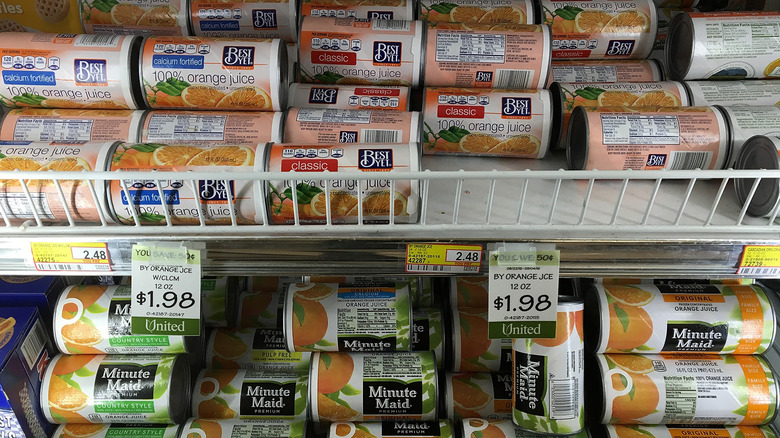Why Nobody Buys Frozen Orange Juice Anymore
Whether you had it as a kid on weekend mornings, or first thing every day as an adult, orange juice is widely considered a staple among breakfast beverages. This is because it touts a variety of vitamins and minerals essential for your health. With its rise in popularity over the years, orange juice can be found in many flavors and varieties. One of those, frozen concentrate, was once a hit with juice lovers for reasons like easy storage and an extensive shelf-life. However, despite still being found at grocery stores, frozen juice concentrate has seen a decline due to consumer perception of it and juice as a whole.
The concentration process removes most of the water after being squeezed from the fruit, and that filtering could diminish the flavor. To amend this, juice companies may ramp up the flavor with additives, sweeteners, and sodium. There's also the issue of evidence pointing to frozen concentrate actually having less nutrition than not-from-concentrate juice. While the calories and sugar content could remain the same, some frozen orange juice brands will fall short of having orange juice's other benefits, like iron, potassium, and fiber.
Frozen orange juice isn't all bad, but juice does have a skewed public perception
In all fairness, there is reason for orange juice fans to remember why frozen orange juice was invented (so soldiers overseas could get vitamin C), and that shouldn't be immediately dismissed. Removing the water from juice makes the beverage easily transported and stored. Additionally, the filtration process extends orange juice's shelf life. The reason for this is that by minimizing the water content, the concentration process lowers the chance of harmful bacteria building. When it comes to the nutritional value of frozen orange juice, while it still depends on the manufacturer, look for "100% juice" on the label to maximize the nutrients you're getting from it.
It's also important to consider that fruit juice, in general, isn't held in the same light as it once was. Despite its health benefits, consumers have become increasingly aware of its high sugar content. Certainly, there are light and sugar-free alternatives offered from the best and worst orange juice brands, but there are a slew of better ways to get those essential nutrients. You can incorporate those fruits into your diet by simply eating them or by opting to indulge in a smoothie. Experts say that it's healthy to have one every day, so long as you use the right ingredients – they can even be more flavorful by adding frozen fruit.

